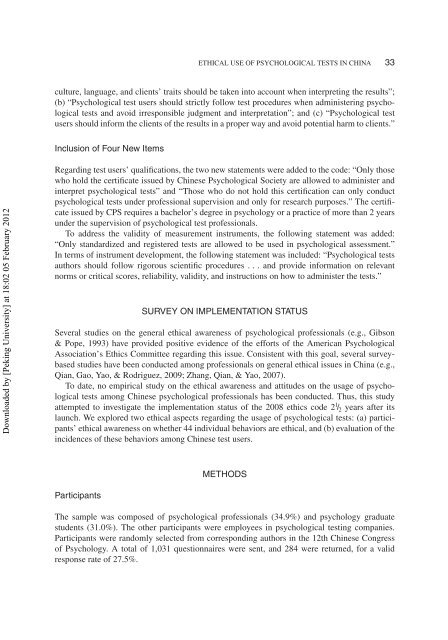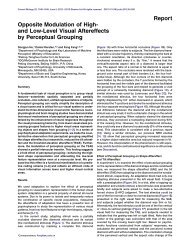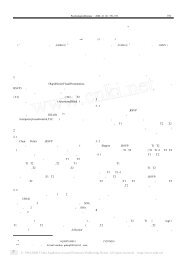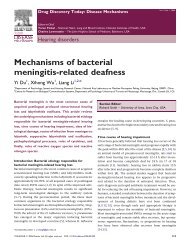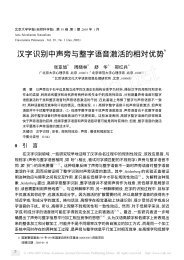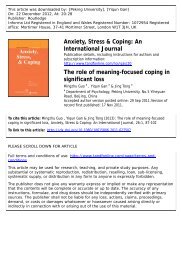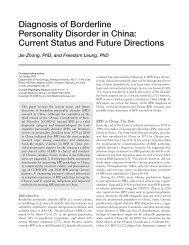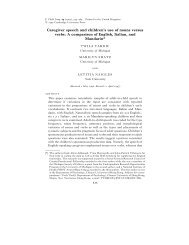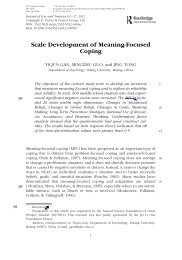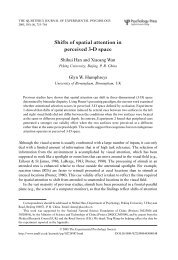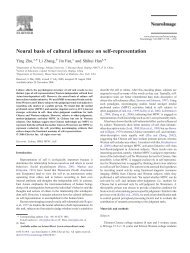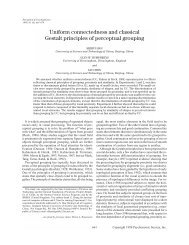2008 Revision of the Chinese Code of Ethical Use of Psychological ...
2008 Revision of the Chinese Code of Ethical Use of Psychological ...
2008 Revision of the Chinese Code of Ethical Use of Psychological ...
You also want an ePaper? Increase the reach of your titles
YUMPU automatically turns print PDFs into web optimized ePapers that Google loves.
ETHICAL USE OF PSYCHOLOGICAL TESTS IN CHINA 33culture, language, and clients’ traits should be taken into account when interpreting <strong>the</strong> results”;(b) “<strong>Psychological</strong> test users should strictly follow test procedures when administering psychologicaltests and avoid irresponsible judgment and interpretation”; and (c) “<strong>Psychological</strong> testusers should inform <strong>the</strong> clients <strong>of</strong> <strong>the</strong> results in a proper way and avoid potential harm to clients.”Inclusion <strong>of</strong> Four New ItemsDownloaded by [Peking University] at 18:02 05 February 2012Regarding test users’ qualifications, <strong>the</strong> two new statements were added to <strong>the</strong> code: “Only thosewho hold <strong>the</strong> certificate issued by <strong>Chinese</strong> <strong>Psychological</strong> Society are allowed to administer andinterpret psychological tests” and “Those who do not hold this certification can only conductpsychological tests under pr<strong>of</strong>essional supervision and only for research purposes.” The certificateissued by CPS requires a bachelor’s degree in psychology or a practice <strong>of</strong> more than 2 yearsunder <strong>the</strong> supervision <strong>of</strong> psychological test pr<strong>of</strong>essionals.To address <strong>the</strong> validity <strong>of</strong> measurement instruments, <strong>the</strong> following statement was added:“Only standardized and registered tests are allowed to be used in psychological assessment.”In terms <strong>of</strong> instrument development, <strong>the</strong> following statement was included: “<strong>Psychological</strong> testsauthors should follow rigorous scientific procedures ...and provide information on relevantnorms or critical scores, reliability, validity, and instructions on how to administer <strong>the</strong> tests.”SURVEY ON IMPLEMENTATION STATUSSeveral studies on <strong>the</strong> general ethical awareness <strong>of</strong> psychological pr<strong>of</strong>essionals (e.g., Gibson& Pope, 1993) have provided positive evidence <strong>of</strong> <strong>the</strong> efforts <strong>of</strong> <strong>the</strong> American <strong>Psychological</strong>Association’s Ethics Committee regarding this issue. Consistent with this goal, several surveybasedstudies have been conducted among pr<strong>of</strong>essionals on general ethical issues in China (e.g.,Qian, Gao, Yao, & Rodriguez, 2009; Zhang, Qian, & Yao, 2007).To date, no empirical study on <strong>the</strong> ethical awareness and attitudes on <strong>the</strong> usage <strong>of</strong> psychologicaltests among <strong>Chinese</strong> psychological pr<strong>of</strong>essionals has been conducted. Thus, this studyattempted to investigate <strong>the</strong> implementation status <strong>of</strong> <strong>the</strong> <strong>2008</strong> ethics code 2 1 / 2 years after itslaunch. We explored two ethical aspects regarding <strong>the</strong> usage <strong>of</strong> psychological tests: (a) participants’ethical awareness on whe<strong>the</strong>r 44 individual behaviors are ethical, and (b) evaluation <strong>of</strong> <strong>the</strong>incidences <strong>of</strong> <strong>the</strong>se behaviors among <strong>Chinese</strong> test users.METHODSParticipantsThe sample was composed <strong>of</strong> psychological pr<strong>of</strong>essionals (34.9%) and psychology graduatestudents (31.0%). The o<strong>the</strong>r participants were employees in psychological testing companies.Participants were randomly selected from corresponding authors in <strong>the</strong> 12th <strong>Chinese</strong> Congress<strong>of</strong> Psychology. A total <strong>of</strong> 1,031 questionnaires were sent, and 284 were returned, for a validresponse rate <strong>of</strong> 27.5%.


